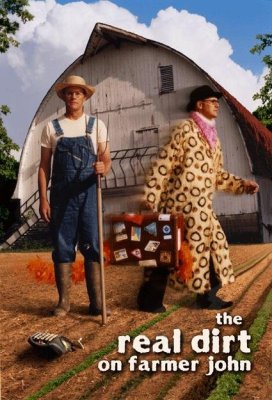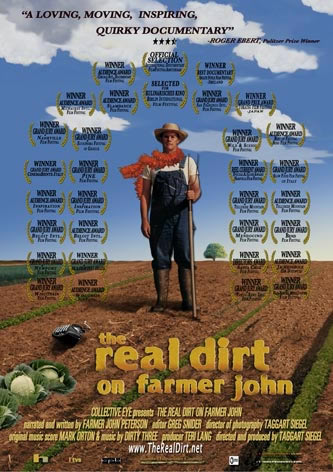THE REAL DIRT ON FARMER
JOHN
 |
by Roger
Ebert
The filming of "The
Real Dirt on Farmer John" essentially began on that
day in the 1950s when John Peterson's mother, Anna, brought home
a Super-8 movie camera. A farmer's wife and school teacher from
Caledonia, Ill., she filmed her family working in the fields,
her children playing in the yard, the raising of a barn, the
changing of the seasons and the harvest dinners supplied to neighbors
who came to help with the threshing. |
The film has been directed and photographed by Taggart Siegel, who has been filming Peterson and his farm for more than 20 years. This is a loving, moving, inspiring, quirky documentary that was made while the lives it records were being lived. We get a sure sense for the gradual death of the American family farm, the auctions of land and farm equipment, the encroachment of suburban housing, and then an almost miraculous rebirth through the introduction of organic gardening. Fruits and vegetables in America have lost half their nutritive value in the last century, and those pretty hothouse tomatoes contain a fraction of the nutrients and phytochemicals in an organic tomato, but visionaries like Peterson are finding a way back to the land. Let it be observed, however, that Peterson is a strange man, and celebrates his own oddities. He wrote and reads the narration, which is that of a man who has one foot in the counterculture and the other in rich organic soil. He likes to dress strangely, in Dr. Seuss hats or bumblebee costumes. He is taken to dancing wildly in the fields. He is told his speech and body language make him appear to be homosexual, but there is persuasive evidence of heterosexuality in the series of girlfriends who keep him in "relationships" through the decades. |
|
| The heroine of the film is his mother, a high-spirited 83-year-old
when we meet her, who persuades John not to quit the farm because
how could she live without her roadside produce stand? A free-
thinker who likes Jim Morrison although he didn't "dress nice," she
is an articulate life force. Through her we glimpse John's father,
his uncles and aunts, and the neighbors of a vanished farm culture. The miracle of Angelic Organics begins the day in the 1990s some Chicago investors in Community Supported Agriculture buy one of his organic onions, call him up, and offer to go into business with him. Today the Peterson farm is co-owned and operated with his CSA partners, delivers fresh produce to hundreds of customers every week, has expanded, is working in a way Peterson's father could never have imagined. Oh, and John has finally put to rest those rumors about devil worship, orgies and drug abuse, which were never true, but if a man is going to wear a Dr. Seuss hat and have hippies living in his barn, he's got to expect that people will talk.
Cast & Credits |
 |
| CAVU Pictures presents a documentary directed by Taggart Siegel. Written and narrated by John Peterson. Running time: 83 minutes. No MPAA rating. | |